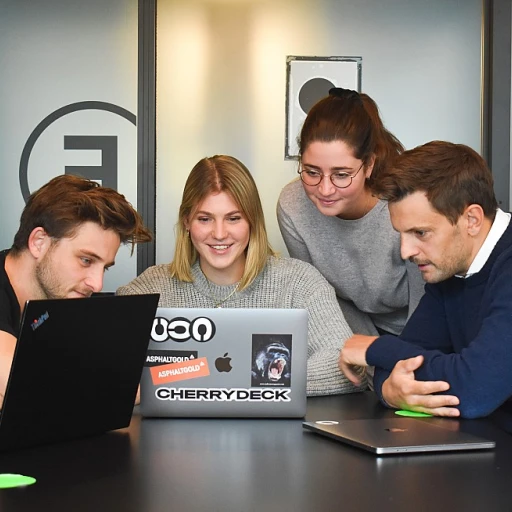Understanding the Role and Responsibilities
Diving into the Role and Responsibilities
When preparing for an HR interview, one of the most fundamental aspects to explore is a clear understanding of the role you are applying for and its associated responsibilities. This knowledge is crucial as it sets the foundation for a successful interview process. As a candidate, demonstrating a firm grasp of the role not only shows your passion and interest but also your readiness to contribute.
Begin by researching the job description thoroughly and highlighting key responsibilities that align with your skills and experiences. During the interview, consider asking questions like, "Can you describe a typical day in this position?" or "What are the team's primary goals that this role supports?" These inquiries indicate your proactive approach to integrating into the team and your commitment to aligning your efforts with the organization's objectives.
Furthermore, understanding the role extends beyond daily tasks. It encompasses the strategic impact the role has within the company. You might ask, "How does this position contribute to the overall success of the HR department?" This question demonstrates your eagerness to grasp the broader perspective of your potential contribution.
Asking targeted questions about responsibilities can also uncover essential insights into the company's expectations and can subtly guide the conversation towards the upcoming topics like exploring company culture or assessing team dynamics. By doing so, you set a proactive tone and establish a foundation for meaningful, informative interactions throughout the interview.
Delving into the specifics of the role not only assists in aligning yourself with the company’s needs but also paves the way for subsequent discussions about elements like career growth and development, as well as the initiatives towards diversity, equity, and inclusion.
Exploring Company Culture
Gaining Insight into the Company's Core Values
When you're sitting across from your interviewer, trying to gauge if this new potential professional home is the right fit, understanding the company's core values is essential. It offers you a glimpse into what the organization truly stands for and prioritizes. Seeking clarity about their values can help ensure your personal values align, positioning you for a rewarding experience.
To effectively explore company culture, you might ask: "Can you share an example of how the company values are implemented in day-to-day operations?" This question not only helps unveil the company's ethos but also provides tangible examples of how employees embody these values.
Determining the Work Environment
Another critical element of understanding company culture is assessing the work environment. The dynamics of the office or virtual setting can significantly influence your productivity and satisfaction. Inquire about the work environment by asking, "What does a typical day look like for someone in this role, and how does the team usually interact?" This will allow you to visualize your potential workday and understand the communication style adopted by the team, complementing the information from the section on assessing team dynamics.
Understanding Employee Engagement and Well-being
Finally, it is invaluable to delve into how the company supports employee engagement and well-being. Organizations that value their workforce tend to have higher morale and productivity levels. To gauge this aspect of company culture, you might incorporate questions such as: "What initiatives does the company have in place to promote employee well-being and work-life balance?" This will provide insight into the emphasis the company places on nurturing its employees, fostering a positive and supportive work environment.
Assessing Team Dynamics
Unveiling Team Synergy and Structure
When engaging with potential employers, it's vital to not only understand your own role but also grasp how you'll fit into the wider team dynamic. To ascertain this, you may want to ask insightful questions regarding the team you're about to join.
Start by inquiring about the team structure. Questions such as "Can you describe the team I’ll be working with?" or "How is the team currently structured?" can provide insights into the workflow. Understanding the size and hierarchy of the team can help you gauge the level of collaboration and communication you'll experience.
Delve deeper into team dynamics by asking, "How does the team collaborate on projects?" or "What are some successful team projects this group has undertaken?" These questions not only show your interest in teamwork but also reveal how often collaboration is fostered within the team environment.
Additionally, it's worth understanding how your performance will be assessed within the team. You could ask, "How is success measured for this team?" This will help you align your goals and expectations with the company's objectives.
Remember, exploring team dynamics is a part of your broader preparation for the interview process. It not only offers a glimpse into your potential work environment but also sets the stage for a successful integration into the company. For further guidance on preparing for your HR interview, check out our
preparation checklist.
Evaluating the Hiring Process
Diving Deep into the Recruiting Strategy
A candidate's exploration of a company's hiring process can reveal much about the organization's priorities and strategic goals. Asking the right questions during HR interviews allows you to ascertain how crucial roles are filled, ensuring alignment with your professional aspirations and values.
To begin, inquire about the typical stages of their hiring process. Understanding how an organization structures its recruitment can provide insights into their commitment to thoroughness and fairness. This knowledge helps you gauge if the company accommodates rigorous evaluation methods, indicative of a high-performance workforce.
Next, ask about the qualities and skills the company prioritizes in candidates. This is integral not only to discern what the team currently requires but also to reflect on aspects of company culture and values. It feeds into the broader picture of how this organization positions itself in its industry, resonating with themes discussed in exploring company culture.
Furthermore, seek to understand the role of cross-departmental collaboration within the hiring process. Information here can also connect back to assessing team dynamics, revealing the extent of cooperation and communication, and the feedback loop used in selecting the right fit.
Lastly, consider asking how the company ensures an unbiased and inclusive recruitment process. This connects with our discussion on promoting diversity, equity, and inclusion, offering a window into the company's genuine commitment to nurturing a diverse workplace.
Probing into these aspects will provide a well-rounded perspective on the company's methodologies for talent acquisition, preparing you to make informed decisions regarding your future with them.
Discussing Career Growth and Development
Opportunities for Advancement
Aspiring to grow and develop within an organization is a crucial factor for many job seekers. During your HR interview, inquiring about career advancement opportunities will provide insight into whether the company supports and encourages professional growth. Ask questions like, "What does the typical career progression look like for this role?" or "Are there formal programs in place for training and development?" This reveals the organization's commitment to nurturing talent and promoting from within.
Support for Continuous Learning
The modern workplace is dynamic, and continuous learning is essential for staying relevant. Understanding how the company facilitates ongoing education and learning can be a significant indicator of its investment in employee growth. You might want to ask, "Does the company offer any assistance for further education or certifications?" or "How do the leaders encourage a culture of learning and development?" These questions help determine if the company values self-improvement and adapts to new challenges.
Performance Feedback Mechanisms
Receiving constructive feedback is vital for personal and professional development. Inquiring about the performance review process can give you a sense of how transparent and frequent feedback is within the organization. Consider asking questions like "How often are performance reviews conducted?" and "What kind of support can employees expect if they need to improve their performance?" Understanding how feedback is managed will help you gauge how the organization helps employees reach their full potential.
Addressing Diversity, Equity, and Inclusion
Ensuring an Inclusive Workplace Environment
When preparing for an HR interview, it is crucial to address the organization's stance on diversity, equity, and inclusion (DEI). Ask about the company’s DEI policies and initiatives to understand how they integrate these principles into their workplace culture. This reflects both the organization's values and its commitment to fostering a diverse environment, which can impact employee satisfaction and retention.
Inquiring About DEI Training and Resources
Consider questioning what resources and training programs are available for employees to promote an inclusive workspace. This can indicate the level of support you can expect from the organization and how proactively they engage with DEI issues. It’s important to know if the company provides ongoing training or resources that help employees understand and contribute to a positive, inclusive atmosphere.
Examining Representation in Leadership
Another key area to explore is the representation within the company’s leadership. Ask about the diversity among the executive team and how they plan to ensure diverse voices are heard in decision-making processes. This reveals the company’s commitment to diversity not just in hiring, but in developing diverse leaders.
As you delve into these aspects during your HR interview, you will gain a clearer picture of how the company embodies diversity, equity, and inclusion in its everyday operations, consistent with what you have learned about assessing team dynamics and company culture.



